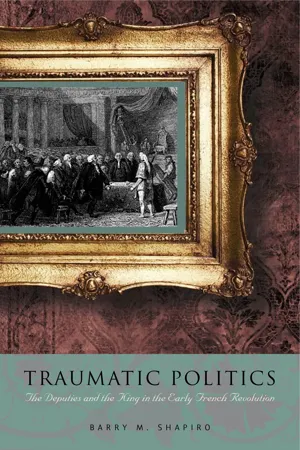
Traumatic Politics
The Deputies and the King in the Early French Revolution
Barry M. Shapiro
- English
- PDF
- Available on iOS & Android
Traumatic Politics
The Deputies and the King in the Early French Revolution
Barry M. Shapiro
About This Book
The opening events of the French Revolution have stood as some of the most familiar in modern European history. Traumatic Politics emerges as a fresh voice from the existing historiography of this widely studied course of events. In applying a psychological lens to the classic problem of why the French Revolution's first representative assembly was unable to reach a workable accommodation with Louis XVI, Barry Shapiro contends that some of the key political decisions made by the Constituent Assembly were, in large measure, the product of traumatic reactions to the threats to the lives of its members in the summer of 1789. As a result, Assembly policy frequently reflected a preoccupation with what had happened in the past rather than active engagement with present political realities.
In arguing that the manner in which the Assembly dealt with the king bears the imprint of the behavior that typically follows exposure to traumatic events, Shapiro focuses on oscillating periods of traumatic repetition and traumatic denial. Highlighting the historical impact of what could be viewed as a relatively "mild" trauma, he suggests that trauma theory has a much wider field of potential applicability than that previously established by historians, who have generally confined themselves to studying the impact of massively traumatic events such as war and genocide. Moreover, in emphasizing the extent to which monarchical loyalties remained intact on the eve of the Revolution, this book also challenges the widely accepted contention that prerevolutionary cultural and discursive innovations had "desacralized" the king well before 1789.
Frequently asked questions
Information
Table of contents
- Front Cover
- Title Page
- Copyright
- Contents
- Acknowledgments
- Introduction
- Prologue to Part I
- 1. Arrival in Versailles
- 2. The King and His Evil Advisers
- 3. Defiance at the JEU DE PAUME
- 4. The Royal Sesson of 23 June
- 5. The Reunion of 27 June
- 6. The July Crisis
- 7. The Immediate Aftermath of the July Crisis
- Prologue to Part II
- 8. An Incident at the Abbaye
- 9. The Passage of the Suspensive Veto
- 10. Mirabeau and the Exclusion of Deputies from the Ministry
- 11. Royal Military Power and the Lingering Effects of Trauma
- Conclusion
- Selected Bibliography
- Index
- Back